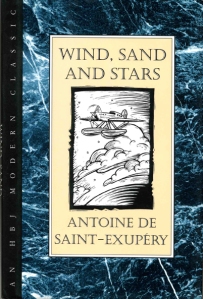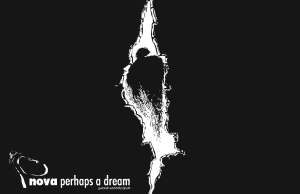illusion of freedom
November 27, 2012 § Leave a comment
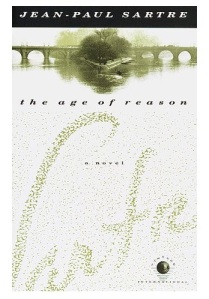 the age of reason by jean-paul sartre is what i consider a piece of lierature with all the glamours and nuances of a beautifully written one. it is one of the few books i’ve read that carries you through each character’s thoughts, feelings and lines of reasoning. the plot and story line is not the book’s forte, rather the way sartre developed its simple story into a book, which you don’t want to put down, is its excellence.
the age of reason by jean-paul sartre is what i consider a piece of lierature with all the glamours and nuances of a beautifully written one. it is one of the few books i’ve read that carries you through each character’s thoughts, feelings and lines of reasoning. the plot and story line is not the book’s forte, rather the way sartre developed its simple story into a book, which you don’t want to put down, is its excellence.
the book narrates a scholarly-styled life of a philosophy professor who tries to maintain what he defines freedom in his life, in spite of all the events and people that want to force him towards what sartre calls the age of reason. the age at which apparently you should start to be responsible and to care for your deeds as well as the life of people around you. it somehow sounds like a rite of passage, except that the protagonist never passes over. this book is the start of a trilogy called the roads to freedom, however so far the only freedom depicted was the professor’s perspective of it, or better to say his fear of responsibility and commitment. all the rest of the characters seem to have a tendency to intentionally escape this type of freedom.
it’s very hard to tell if sartre’s perspective is a reflection of his own mind or he is narrating a familiar story, for although he explains all the scenes, feelings, thoughts and actions very well, it doesn’t sound to be a real story.
i know sartre as a philosopher, an existentialist, however i recognize this book as just a well written novel and although it is very tempting to label it as an existentialist book, it doesn’t fit very well. in my opinion the concept of fiction/novel defies the fundamentals of existentialism. based on existentialism the story you are reading is not the same story the author wrote!
to conclude, i enjoyed the book and i look forward to reading the rest of the trilogy.
a left brainer story for right brainers
August 27, 2012 § Leave a comment
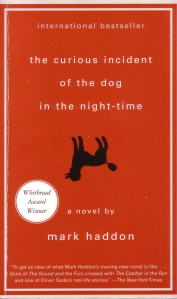 the curious incident of the dog in the night-time by mark haddon was very addictive and very easy to read. it didn’t have much to say in terms of story, plot, character development and morale, however it had the most brilliant writing style, which was the only reason i finished the book and was happy that i read it.
the curious incident of the dog in the night-time by mark haddon was very addictive and very easy to read. it didn’t have much to say in terms of story, plot, character development and morale, however it had the most brilliant writing style, which was the only reason i finished the book and was happy that i read it.
the book is about a boy with extreme case of autism and his stream of thoughts and feelings. reading the book, you realize that mark knows a lot about autistic children and if you don’t know anything about autism, like myself, all the reactions and behaviours seem to be defined and explained properly and based on an autistic-mind line of reasoning, however there are a few, which he forgets to connect to a cause, like the fact that he does not like to be touched, or his carrying around a swiss army knife, etc.
i doubt the book is very popular among the autistic people, as it sounds debasing and insulting at some points, but i’m pretty sure non-autistic people will enjoy it due to the new style and the fact that it opens a new perspective to the world which non-autistic people will never be able to comprehend.
the only message i’ve got from the book, and i doubt it was the message the author wanted to transfer, was that looking from the eyes of anybody and at the same time walking in their shoes, you will sure do what they were going to do at each moment, and understanding this gives you a world of happiness.
story of your own life
July 22, 2012 § Leave a comment
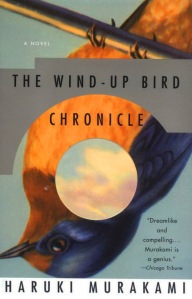 after i read kafka on the shore, i fell in love with murakami’s books. i finished one of his earlier and most praised novels, the wind-up bird chronicle, which now becomes my second favourite murakami book after kafka on the shore. you start reading the book delving into an ordinary life of an ordinary man. step by step new events and characters unravels and you are presented with a lot of quirky, out-of-this-world situations, and by the end of the book, you are confused as to which and who was real and what was not.
after i read kafka on the shore, i fell in love with murakami’s books. i finished one of his earlier and most praised novels, the wind-up bird chronicle, which now becomes my second favourite murakami book after kafka on the shore. you start reading the book delving into an ordinary life of an ordinary man. step by step new events and characters unravels and you are presented with a lot of quirky, out-of-this-world situations, and by the end of the book, you are confused as to which and who was real and what was not.
i love murakami’s style, as his books are very much life-like, at the same time full of supernatural events and characters. this quality rejuvenate and recuperate your sense of believing in fairy tales again, especially if you are too deep into the “real” mundane life’s curriculum. like your own book of life, there are various people and events introduced in this book that at first you do not understand the reason, but as you go forward and dive deeper while pondering upon their sheer existence, you seem to be able to connect the dots and unravel their purpose.
the reality of the book, which i call the superficial plot, contains a lot of sad stories happening in parallel, a family destruction, different detailed obscene plots of war and its side-effects, different gore murder/torture scenes, dysfunctional families, etc. and again like the real world you can see all those people are living their ordinary lives, without the need for your sympathy.
the name chosen for the book makes perfect sense. the wind-up bird is the bird that can be heard by only few characters throughout the book and the moment they heard it, was marked as the turning point of their life, like the epigraph of a new chapter. even the protagonist nickname mr. wind-up bird makes perfect sense as the book is all about his life’s junctures. it is as you are hearing the stories from the point of view of this bird.
this book is what i called an outstanding literature, one that you can easily relate, one that you can live and enjoy, even long after you finished it, and at the same time in my humble opinion is a perspective changer.
you will know it, when real life happens
July 19, 2012 § Leave a comment
living the real life, working the real job, talking the real talk…this is what makes you explore the real valuables in the world
you will know it, when real life happens
the past few days i lived in my dreams.
i showered in the lake and dried up on warm flat stones.
i pumped the water from the lake to the house.
i slept watching the starts and listening to the calming sounds of the waves.
i woke up with the morning breeze and the sun shining on my face.
i drew things.
i read my book.
i helped with the sales at the giftshop.
i drank strawberry house wine.
i explored caves.
i got lost in the forest.
i cleaned the compost toilet after visitors left the island.
i stored food in the basement.
i watered the plants using pails from the lake.
i filtered my drinking water.
i danced in the sun and sang by the water.
i washed my clothes in the lake and let them air dry.
i talked to strangers and listened to their stories.
View original post 15 more words
inventing a story or telling lies?
September 5, 2011 § Leave a comment
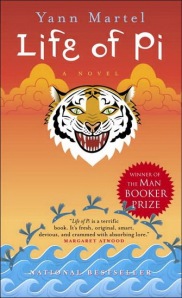 i finished the life of pi by yann martel a month ago, every time i decided to write something about it, i got stuck in the ‘so, what was it really about?’ state and procrastinate. i still don’t know how to interpret the book but i try writing something anyway.
i finished the life of pi by yann martel a month ago, every time i decided to write something about it, i got stuck in the ‘so, what was it really about?’ state and procrastinate. i still don’t know how to interpret the book but i try writing something anyway.
i believe you can read the book hundred times and each time get a new idea. however, the book is very hard to read even twice because of its lengthy descriptive passages and in my opinion unrelated stuffs such as list of survival tips on a lifeboat, detailed zoological references, etc. (to be honest, i skipped a few of these overly emphasized paragraphs here and there) although i think those were there to fill the scientific portion of the book in order to show balance between its scientific and spiritual perspectives.
anyways, the book is about an indian boy who is interested in the core of most religions, god, and tries different paths of different religions to approach it. he is a son of a zoo keeper and has a lot of zoological hands-on experiences. past the few introductory first chapters, the story takes its major turn when he and his family emigrate to canada with a japanese ship. the ship sank and the boy is allegedly the sole survivor of the incident when he reaches to mexico after more than 200 days in a lifeboat with a tiger!
throughout this seem-to-be-simple story of survival, the reader goes through a lot of happenings. the story is told in first person form, by an adult person who is telling his life story using his childhood memories, which are now mixed with his adulthood believes (confusing, isn’t it?). underneath the simple story is a vast ocean of ideological, philosophical, spiritual and psychological hints that come in riddle form and need a puzzle solving mind to unravel them. reality and imaginations are so intertwined that the reader has to decide one by one as to which is which.
the best part of the book in my opinion is towards the end of the book, in the later chapters when pi is explaining his story to japanese maritime minister. the reader is in for a surprise, a huge turn that makes you question your whole understanding of the book, makes you review or even read the book again, just to be at peace with your mind. it has a deep philosophical essence which i relate it to hermeneutics. something very close to “big fish” or “the fall” movies, as the writer says, it’s all about how you like to hear a story with animals better than one without. the dilemma of believing your past days being your best days or feeling bad about every minute of your life. positive versus negative perspective. you want to call it lying, you want to call it inventing, the writer’s idea is:
isn’t telling about something – using words – already something of an invention?
a postmodern novel
May 24, 2011 § 5 Comments
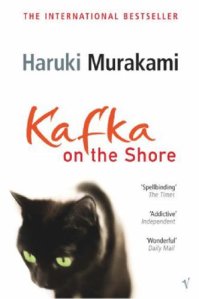 “kafka on the shore” by haruki murakami is definitely one of the most destructivist novels i have ever read. almost nothing is by the book. people appear and disappear in the story without serving any purposes, too many loose ends left to the readers imaginations, the main characters are undeveloped and at the same time a side character is over-developed. surreal events like raining fish and leeches, random characters like kfc’s colonel sanders and johnnie walker play important roles even though their job is pimping and cat killing, and so many other unconventional adventures.
“kafka on the shore” by haruki murakami is definitely one of the most destructivist novels i have ever read. almost nothing is by the book. people appear and disappear in the story without serving any purposes, too many loose ends left to the readers imaginations, the main characters are undeveloped and at the same time a side character is over-developed. surreal events like raining fish and leeches, random characters like kfc’s colonel sanders and johnnie walker play important roles even though their job is pimping and cat killing, and so many other unconventional adventures.
characters cannot escape their fate despite their best efforts, and at the same time they are contented and even happy to surrender to their destiny, as if stoicism is ruling the world. nothing is defined as a rigid rule, there is no right and wrong, there is no predefined relationships, no taboos, no sacred objects, everything shapes as the story progresses and as colonel sanders explains:
every object is in flux. the earth, time, concepts, love, life, faith, justice, evil – they’re all fluid and in transition. they don’t stay in one form or in one place forever.
all in all the story is very fun, full of surprises, full of metaphors, and of course strongly recommended.
nova perhaps a dream
April 18, 2011 § Leave a comment
watch the movie, submerge in the music, and metamorphose into your next stage…
a sculpture of god
April 9, 2011 § 1 Comment
 a sculpture by drzach & suchy named “shadow cloud“. see how it resembles the god. first of all, it is manmade. it is a well-defined, known identity (cube) with undefined, fuzzy, random-like details. a unique object whose shadow is meaningless, unless you can find the right angle to form a meaningful shape which in this case manifests judaism, christianity, islam (or any other religions for the sake of argument.)
a sculpture by drzach & suchy named “shadow cloud“. see how it resembles the god. first of all, it is manmade. it is a well-defined, known identity (cube) with undefined, fuzzy, random-like details. a unique object whose shadow is meaningless, unless you can find the right angle to form a meaningful shape which in this case manifests judaism, christianity, islam (or any other religions for the sake of argument.)

